LifeRing Overview for ProfessionalsParticipation in LifeRing Secular Recovery is compatible with a wide variety of abstinence-based therapeutic and counseling programs. |
Peer Alternatives for Addiction (PAL) Study • LifeRing Publications
Empower Your Programs and Your ClientsLifeRing Secular Recovery is a peer-to-peer nonprofit organization that embraces the philosophy that there are multiple pathways to recovery. LifeRing serves as a recovery network, empowering those seeking support in recovery from substance use disorders, both as a stand-alone resource and as a supplement to other recovery programs. Our groups and meetings are abstinence-based, but we understand that everyone’s recovery journey is unique. We welcome individuals at all stages of recovery. We ask that participants under the influence abstain from sharing in our forums; however, convenors (meeting facilitators) and members may offer individual support outside of the group setting. We recognize that some members use medically indicated, psychoactive medications prescribed by an informed physician, which may include medication-assisted recovery (MAT/MAR) and pain management medications. We practice a “3-S” philosophy:
LifeRing has no hierarchical structure, and members are encouraged to self-identify as they see fit. We encourage members to see themselves as empowered and not powerless. Polite engagement, or crosstalk, is not only allowed but encouraged in meetings. Many of our meetings focus on the topic "How Was Your Week?" Here, members share challenges and milestones from the past and current weeks and discuss what they are actively doing to maintain their recovery. LifeRing also offers and supports the creation of “focus” meetings designed to address the specific needs of various demographic cohorts. These include • LGBTQIA+ • Veterans • Co-Occurring Disorders • Family & Friends • Seniors • SUD-related Medical Conditions • CPS • Survivors of Domestic Violence |
|
LifeRing offers a variety of recovery support resourcesLifeRing offers a variety of recovery support platforms to support personal recovery programs: Peer-to Peer MeetingsLifeRing Secular Recovery offers a wide variety of online and in-person meetings throughout the world. Our meetings are anonymous and designed to strengthen your commitment and help you build a personal recovery program. Check-in: How Was Your Week? Focus on current and upcoming weeks Topic: Focus of discussion varies Focus: Recovery meetings for people with specific commonalities including: • LGBTQIA+ • Veterans • Co-Occurring Disorders • Family & Friends • Seniors • SUD-related Medical Conditions • CPS • Survivors of Domestic Violence Online: Virtual meetings; focus on discussion varies In-person: On location group meetings; focus on discussion varies depending on interests of group Hybrid: In-person and online combined; focus of discussion varies Chat Rooms: Online text meeting Virtual Gathering SpacesIn addition to meetings, LifeRing also provides secular sobriety support through eResources: EGroups: Group messaging operating much like a 24/7 online meeting ePals: Volunteers work one-on-one to help you navigate LifeRing's resources Delphi Forum: LifeRing's anonymous online discussion board |
How Does LifeRing Work?
Founded in 1997, LifeRing Secular Recovery is an evidence-based, worldwide network of individuals seeking to live in recovery from substance use. We offer peer support in ways that embrace personal growth and continued learning through self-empowerment. Our approach is based on developing, refining, and sharing support and crafting a rewarding life in recovery. In short, we are sober, secular, and self-directed.
Our mutual support network is compatible with a wide variety of treatment modalities. LifeRing’s evidence-based and therapeutic orientation is pragmatic and eclectic. The expert may readily identify elements of CBT, motivational interviewing, REBT and other schools of thought in our practices.
Principles
Our motivational principles are evidence-based and evolve as the science of recovery develops. The Sobriety, Secularity, and Self-Direction principles allow us flexibility and make LifeRing Secular Recovery a healthy and accessible recovery option for everyone.
LifeRing is not a 12-step program. There’s only one “step” – Don't drink or use, no matter what. The philosophy is equally bare-bones: The “Three S” Philosophy: Sobriety, Secularity, Self-Direction.
Sobriety
Sobriety means wellness including abstinence from alcohol and other drugs, unless medically indicated and taken as prescribed (eg. MAT/pain management).
Secularity
Out of respect for people of all faiths or none, our meetings are secular in nature, which means we do not use prayer or talk about religion. Our common shared belief is behavioral modification and the strengthening of one’s “sober self” through group support and clinical recovery methods.
Self-Direction
Empowering Your Sober Self means taking action and maintaining a perspective that supports living well and free from substance use and its related behaviors. Attending meetings and making human connections with peers helps reestablish hope and validates one’s efforts throughout the recovery process. Members become self-empowered and come to decide what meets their individual needs. We help visualize and build recovery upon that foundation. This is your journey. We’re here for support.
LifeRing Participation in Peer Alternatives for Addiction (PAL) Study and Ongoing PAL2 Study
In 2018, the Alcohol Research Group published the findings from their Peer Alternatives for Addiction (PAL) Study. LifeRing played an integral part in this national study comparing 12-step groups to mutual help alternatives. Here are two abstracts based on this study published in the PubMed Central® (PMC) at the U.S. National Institutes of Health's National Library of Medicine (NIH/NLM):
| A longitudinal study of the comparative efficacy of Women for Sobriety, LifeRing, SMART Recovery, and 12-step groups for those with AUD
Conclusions: This study makes a valuable contribution in view of the extremely limited evidence on mutual help alternatives. Results tentatively suggest that WFS, LifeRing, and SMART are as effective as 12-step groups for those with AUDs, and that this population has the best odds of success when committing to lifetime total abstinence. An optimal care plan may thus involve facilitating involvement in a broad array of mutual help groups and supporting abstinence motivation. Zemore, Sarah E et al. “A longitudinal study of the comparative efficacy of Women for Sobriety, LifeRing, SMART Recovery, and 12-step groups for those with AUD.” Journal of substance abuse treatment vol. 88 (2018): 18-26. doi:10.1016/j.jsat.2018.02.004 |
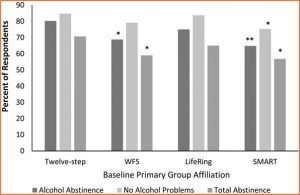 |
|
| Comparison of 12-step groups to mutual help alternatives for AUD in a large, national study: Differences in membership characteristics and group participation, cohesion, and satisfaction
Conclusions: Results suggest differences across 12-step groups and their alternatives that may be relevant when advising clients on a choice of mutual help group. Meanwhile, findings for high levels of participation, satisfaction, and cohesion among members of the mutual help alternatives suggest promise for these groups in addressing addiction problems. Zemore, Sarah E et al. “Comparison of 12-step groups to mutual help alternatives for AUD in a large, national study: Differences in membership characteristics and group participation, cohesion, and satisfaction.” Journal of substance abuse treatment vol. 73 (2017): 16-26. doi:10.1016/j.jsat.2016.10.004 |
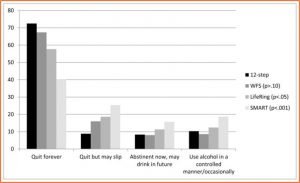 |
LifeRing Publications
Martin Nicolas, co-founder of LifeRing Secular Recovery, has published a number of engaging books for individuals seeking recovery and for service professionals wanting a greater understanding of LifeRing's core ideas and recovery support strategies. Those seeking a solution to alcohol and other drug problems and professionals assisting people with Substance Use Disorder will find great value in these books published through LifeRing Press.
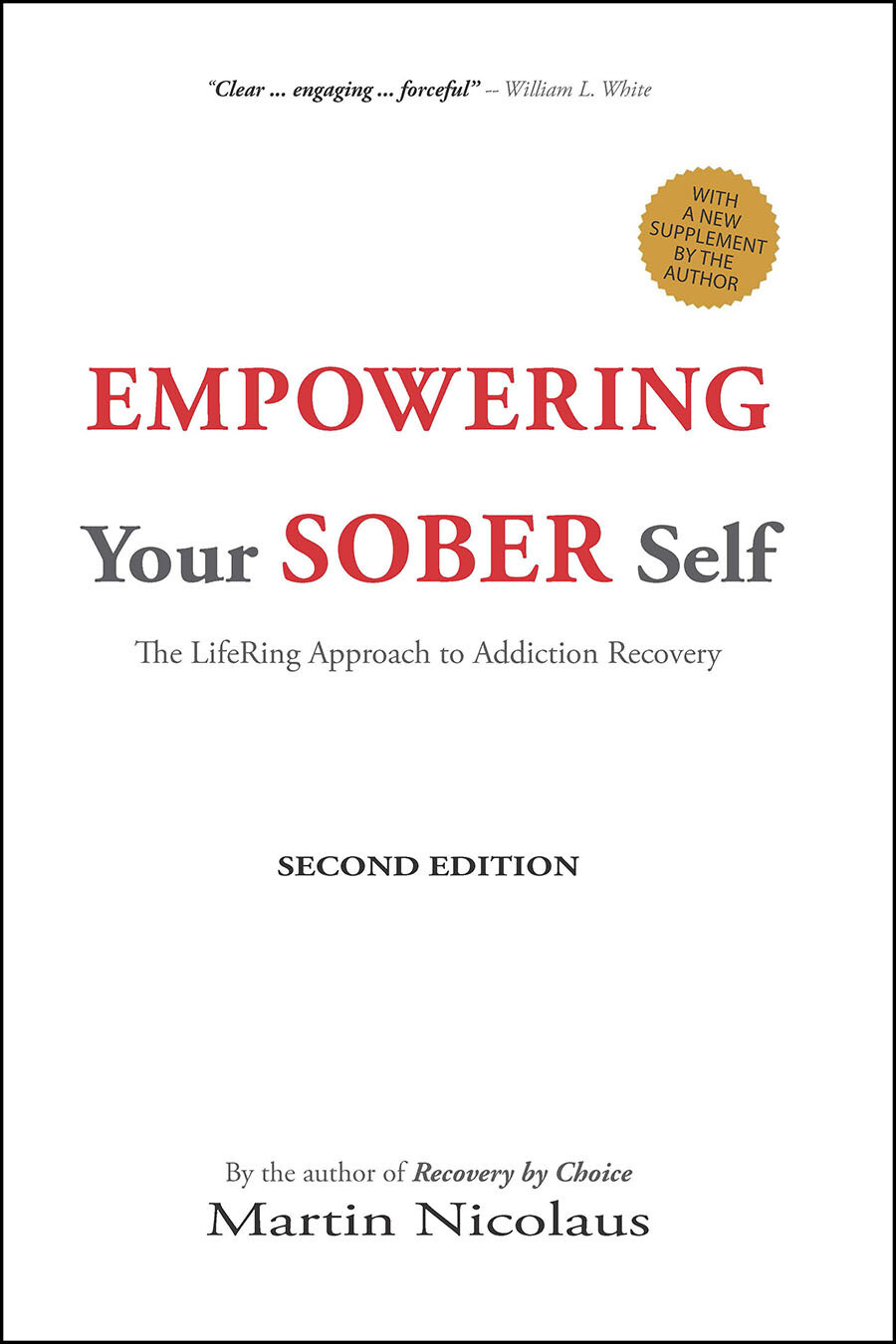 |
Empowering Your Sober Self, 2nd Edition The one book to read for an introduction to LifeRing. Written for the person who wants to get free of alcohol/drugs, for their friends and relations, and for the professionals who treat them. "A sophisticated, insightful, well-documented view of the philosophy and practice that are at the heart of the LifeRing approach. This book offers a perspective on recovery that can motivate change in clinicians and researchers as well as among individuals struggling to find their sober selves." —Carlo DiClemente, Ph.D., professor and chair, Department of Psychology, University of Maryland, Baltimore, and author, Addiction and Change "With impressive analytical clarity and therapeutic generosity, Nicolaus presents a well-argued brief for understanding the complexities of addiction treatment and accepting the full range of diverse paths to recovery. . . . [Anyone] wanting insight and balance on a vitally important public health issue will appreciate the author's lively and respectful presentation." —Judith Herman, M.D., author, Trauma and Recovery |
|
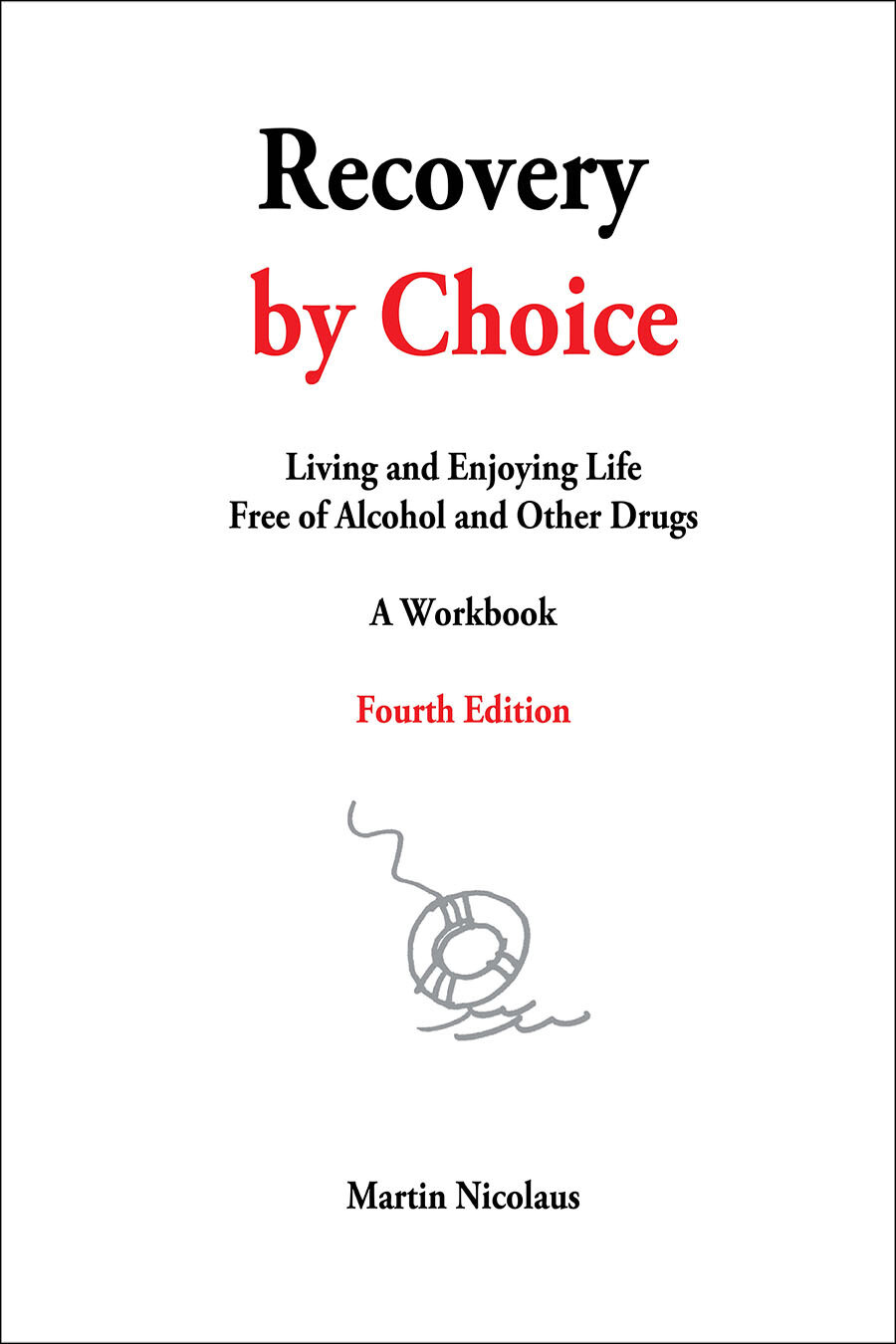 |
Recovery by Choice - A Workbook, Living and Enjoying Life Free of Alcohol and Other Drugs Effective professionals tailor the treatment to fit the client. This is as true in the treatment of addictions as in any other practice. The National Institute on Drug Abuse (NIDA), after a nationwide study of addiction treatment programs, found that: "No single treatment is appropriate for all individuals. Matching treatment settings, interventions, and services to each individual's particular problems and needs is critical to his or her ultimate success in returning to productive functioning in the family, workplace, and society." Recovery by Choice is the first workbook that applies this basic principle of effective professional treatment to the recovering person’s own self-treatment, or self-direction. It provides a structure for the recovering person to build an abstinence-based recovery plan that matches his or her particular problems and needs — an abstinence-based Personal Recovery Program. Based on ten years’ work in support groups, the book presents the recovering person with a series of real-life choices. The options are highly detailed, concrete, and knowing. |
|
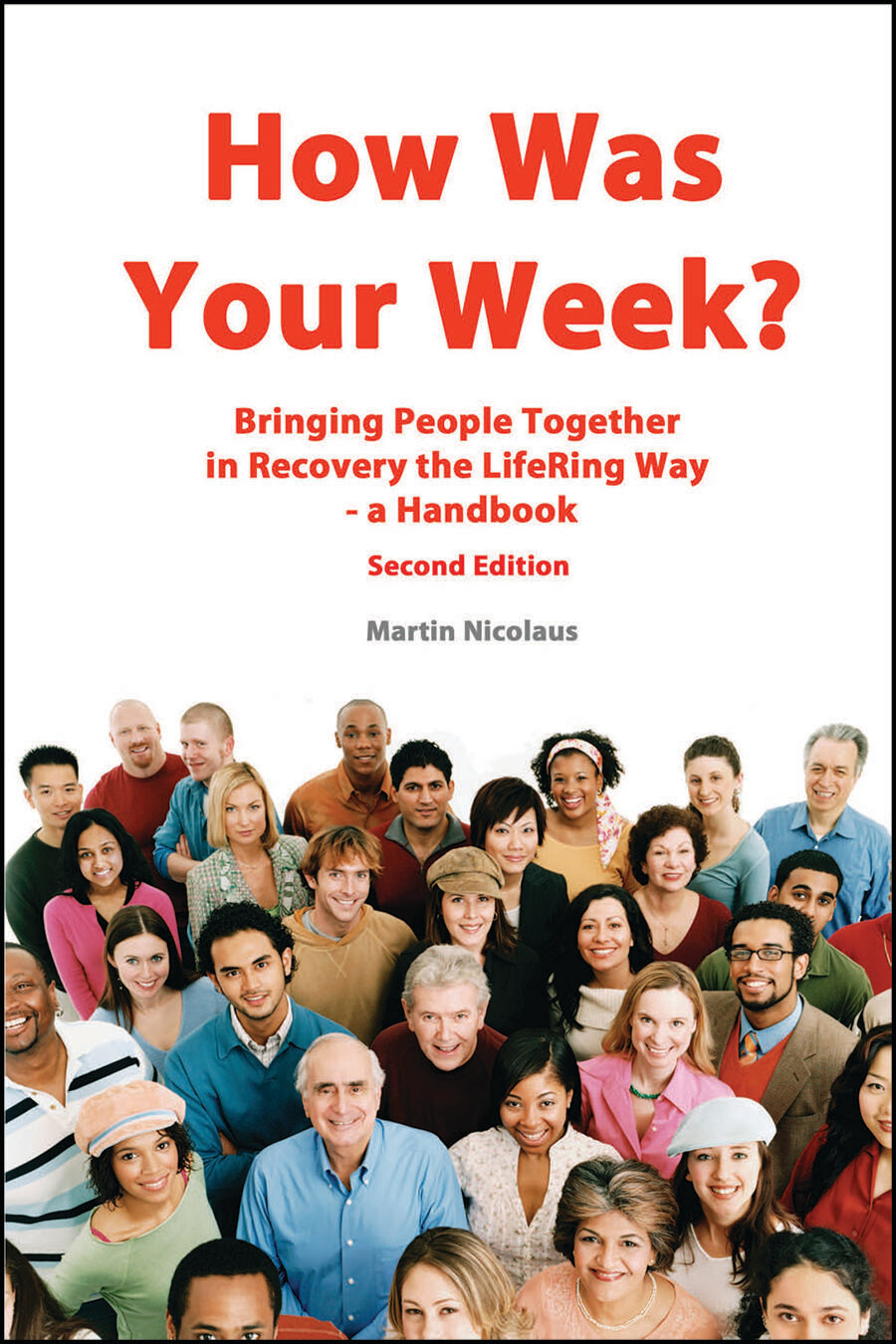 |
How Was Your Week? A Convenor's Handbook, Bringing People Together in Recovery the LifeRing Way This is a critical handbook for the core members of the LifeRing network: the people who start and lead LifeRing meetings, or perform other services that keep the organization humming. The How Was Your Week? Handbook offers an in-depth exploration of the basic model of the LifeRing recovery process: the division of the addicted mind into an addict self (A) and a sober self (S). It outlines the fundamental process at work in LifeRing meetings: empowerment of the sober self. A major portion of this book focuses on the basic philosophy of LifeRing — the three S philosophy. Chapters on Sobriety (Abstinence), Secularity, and Self-Direction offer the deepest and most detailed analysis of these foundations in print. A separate chapter introduces the basics of building a personal recovery program. Although aimed primarily at the convenor, the How Was Your Week? handbook is accessible to anyone who wants a deeper understanding of what LifeRing is about. |
|
 |
Humanly Possible - Stories of Secular Recovery. Kathleen Gargan, Editor; M.K. Co-editor This powerful collection of personal stories focus on success in recovery from substance addiction. There are many such books, but what sets Humanly Possible apart is its emphasis on secular recovery. These are the stories shared by members of LifeRing Secular Recovery and other secular recovery pathways who successfully battled their substance use disorders through self-empowerment. They are living proof that recovery without religion is not only conceivable but readily achievable. The stories offered in this volume, of individuals living free of addictions by means of purely secular ideas, tools and practices provide powerful testimony that what was not long ago thought to be possible only by means of supernatural intervention, is also “humanly” possible. This volume was inspired by the need for such evidence. Without it, countless people whose worldview is strictly secular, have had little basis for believing that they might live according to their own conscience and be free of addiction at the same time. |
